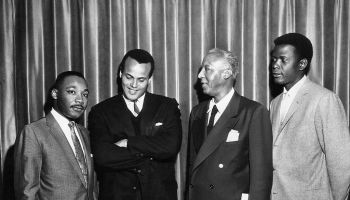A doctor who contracted Ebola in Sierra Leone did not receive aggressive treatments in time — a mistake that led to his death this week.
Dr. Martin Salia did not receive treatment until nearly two weeks after he first started showing symptoms. Salia was flown to the United States in order to be treated for the virus. The doctor was in the 13th day of the illness when he arrived to Omaha, Nebraska. The Associated Press reports:
It took three days for him to be formally diagnosed after an initial test for Ebola came back negative and then another five days to be flown to the United States.
By the time Salia arrived to the University of Nebraska Medical Center in Omaha the virus shutdown his kidneys, making it hard for him to breathe.
“In the very advanced stages, even the modern techniques we have at our disposal are not enough to help these patients once they reach a critical threshold,” said Dr. Jeffrey Gold, chancellor of the medical center.
The government of Sierra Leone is shocked to learn of the doctor’s death and are questioning whether the strain of the flight to Omaha had an impact in his recovery. The government is promising a full investigation into Salia’s treatment.
“At this point, we can’t say for certain whether it was this misdiagnosis or not that led to his death,” Deputy Information Minister Theo Nicol said in a statement to The Associated Press. The government planned to request a full medical report from the hospital where he was last treated.
The doctor’s test for Ebola are also questioning as results initially came back negative. Salia was discharged from a treatment center in Sierra Leone during that time the results were negative.
It’s not unusual to see false negative tests for Ebola in the early stages because the amount of the virus in the bloodstream is still low, said Dr. Phil Smith, the infectious-disease expert who leads the Nebraska Medical Center’s biocontainment unit.
Salia was reportedly receiving blood from an Ebola survivor while in Sierra Leone. The treatment is believed to provide antibodies to fight the virus. In Omaha, he was placed on kidney dialysis and a ventilator and was given several medications. He was given the experimental Ebola drug ZMapp and received another plasma transfusion from an Ebola survivor.
Prior to the doctor’s death, two other Ebola patients were treated in Omaha at the University of Nebraska Medical Center. Those patients have recovered.
SOURCE: AP |PHOTO CREDIT: Handout

















